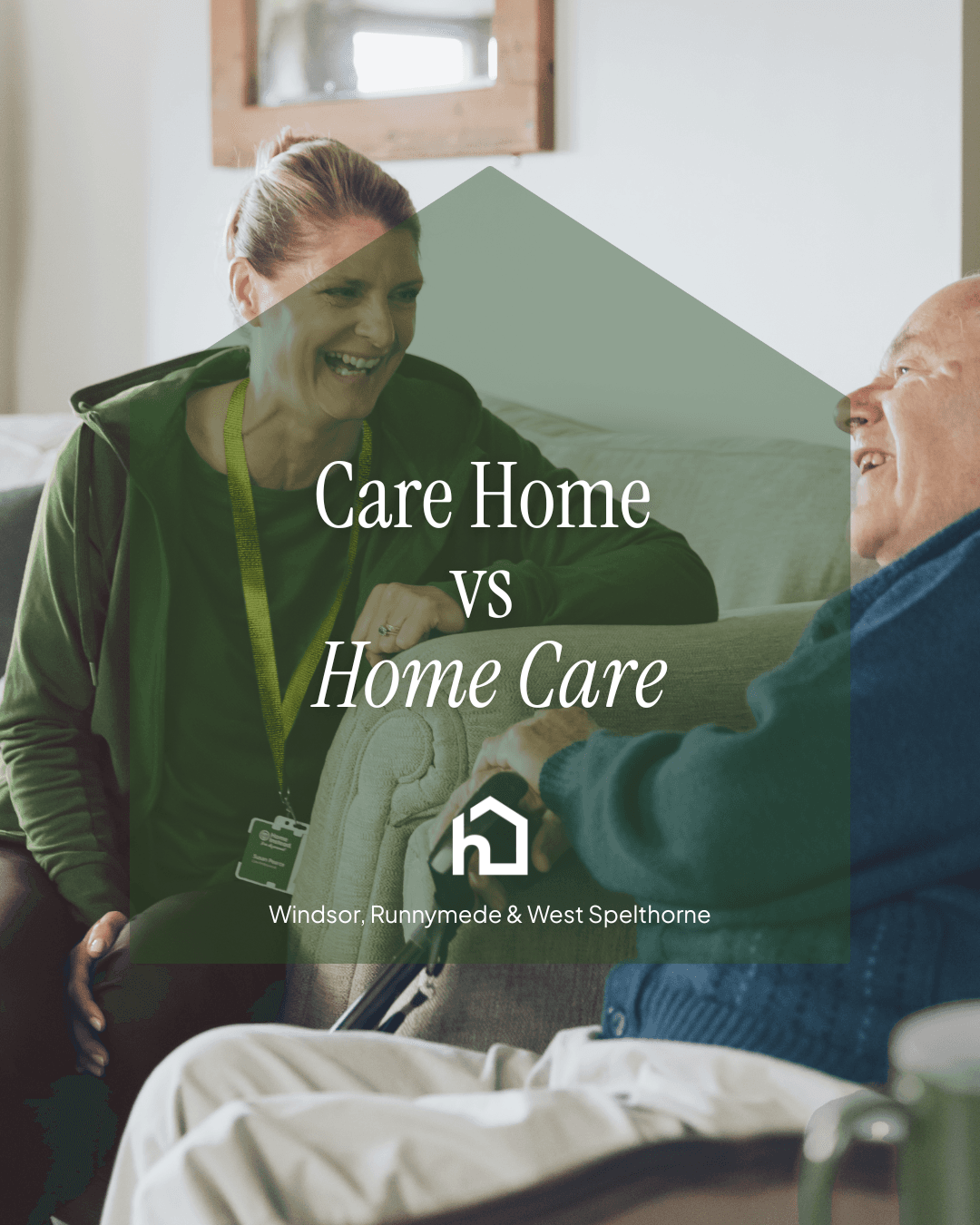Care Home vs Home Care - The Lowdown

Deciding on the right care setting for a loved one is one of the most important choices a family can make. At Home Instead Windsor, Runnymede & West Spelthorne, we understand the emotions behind the decision—and we believe in the power and comfort of staying at home whenever possible. Here’s a guide to help you weigh the differences between a care home and home care, and why, in many cases, home care shines.
What’s the difference?
A care home is a residential facility where older people live full-time, with staff on hand to assist throughout the day and night. It can provide safety, structure and social interaction in a communal setting.
With home care, a professional caregiver comes to your loved one’s home and provides tailored support—compassionate companionship, personal care, help around the house, and where needed, specialist or complex-care support. With Home Instead, this means one-to-one care in the place they love.
Why home care often offers the better option
Some of the advantages that home care can offer are;
Familiar surroundings. Staying in one’s own home means retaining the familiar routines , the memories, the personal pace. At Home Instead, we believe “the home they love” matters.
Tailored care, care your way. Home Instead does not offer “one-size fits all” care, we provide flexible, tailored domiciliary care visits, day, night or live-in, fitting around your loved one’s routines.
Independence and dignity – one of the deepest concerns families have is preserving dignity for their loved one. With our home care, that is just how we are, assistance when needed, but with respect and choice.
Companionship and connection. Too many older adults are isolated or lonely. One of Home Instead’s core services is companionship visits, the same, regular Care Pro visiting for conversation, activities, encouragement.
Cost and transition flexibility. While cost will always depend on circumstances, home care lets you scale support up or down, avoid upheaval for your loved one, and delay or avoid moving into a residential setting if possible.
Family involvement. With our CQC OUTSTANDING rated home care, family members remain central to the care journey, with professionals supporting and enabling them, rather than feeling they’ve “lost control” after a move to a care home.
Situations where a care home may still be necessary
It’s fair to say that in some cases, a care home is the right choice—especially where 24-hour nursing is required, or where the home environment is no longer safe despite adaptations. Some signs might include:
- The older person needs constant skilled nursing or is unstable medically.
- The home setting is unsafe and cannot realistically be adapted short-term.
- Social isolation is so extreme at home that a communal setting could offer more stimulation.
- Family/carers are unable to provide oversight and the older person’s needs are escalating rapidly.
In these cases, professional residential care may make sense—but even then, home care often remains part of the transition and ongoing support.
Our services cover everything from companionship, home help, personal care, overnight care, to specialist dementia or complex health care.
We treat every one of our clients as an individual, with a care plan designed around what they want and need, not what’s convenient for us. We give you the freedom to stay present as a family member rather than a full-time carer: our carers support you and your loved one, so you can simply be daughter, son, sibling again.
To decide what’s right, consider these questions:
- Does your loved one prefer to remain at home and is the home environment safe?
- What is the level and frequency of assistance they need? Daily tasks, personal care, specialist health support?
- How strong are their social connections, and would they fare better with companion-care at home or in a residential setting?
- What will their journey look like in the next 6–12 months? Will needs escalate?
- Can the home be adapted or supported to maintain safety and independence?
- How do you as family feel about your role, do you need a partner in care so that you can spend quality time instead of full-time caring?
At Home Instead, our conviction remains that whenever the circumstances allow, home is better. It’s where memories live, routines matter, comfort is real, and dignity can thrive. For many families in Windsor, Runnymede and West Spelthorne we’ve seen older adults stay active, engaged and safe at home by remaining close to what they know, and surrounded by the people they love.
Of course, this doesn’t mean home care is right in every single situation, but it deserves to be the first consideration. It deserves to be the option you explore thoughtfully and compassionately. And if you choose it, it deserves to be delivered with the quality, care and person-centred approach that we offer at Home Instead.
If you’d like to talk through your loved one’s situation, have a free no-obligation chat or just ask questions, we’d be honoured to support you. Because this decision goes over and above services, it is about life, choice, and home.